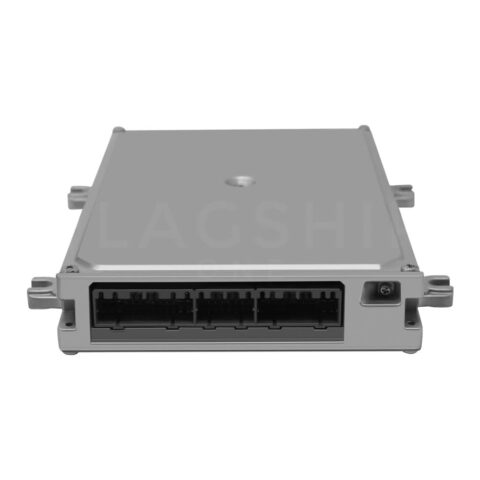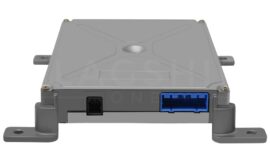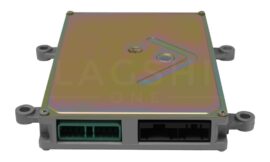Last updated on October 31st, 2024 at 01:33 pm
Acura, a premium brand of the Japanese automotive giant Honda, has long established its reputation for quality, performance, and innovation. With a lineup of vehicles that range from luxury sedans to sporty SUVs, Acura’s dedication to excellence is clearly reflected in the sophisticated design, powerful performance, and advanced technology features of its vehicles.
Central to the seamless operation of any Acura vehicle is the Engine Control Unit (ECU), a crucial component acting as the vehicle’s brain. The ECU controls multiple aspects of the car’s performance including fuel injection, air intake, and ignition timing, ensuring optimal performance, fuel efficiency, and emission control. The ECU’s role in maintaining the overall health and longevity of Acura’s high-performance engines is undeniably vital.
The Cost of a Failing ECU in Acura Models
A malfunctioning Engine Control Unit (ECU) in an Acura can cause a range of issues that not only disrupt the vehicle’s performance but also have a substantial financial impact. One common problem associated with a faulty ECU is high fuel consumption, which significantly increases routine expenses as the vehicle’s fuel efficiency dramatically decreases.
Furthermore, a defective ECU can result in frequent stalling or misfiring, degrading the overall performance of the vehicle. In severe cases, it can even lead to costly engine damage.

Additionally, Acura models with malfunctioning ECUs often experience difficulties with the smooth operation of automated features such as automatic headlights, windshield wipers, and the climate control system. This not only compromises the luxury experience that Acura owners are accustomed to but also places additional strain on the vehicle’s electrical system.
The estimated cost of repairing these Acura-specific issues varies depending on the severity of the problem and the specific model. In general, replacing or repairing a malfunctioning ECU can cost between $500 and $1,500. However, the cost can increase significantly if the ECU failure has caused damage to other vehicle components.
Benefits of a New ECU For Your Car
Upgrading or replacing a malfunctioning ECU in your Acura vehicle brings lots of benefits that not only enhance the overall performance of your vehicle, but also contribute to substantial financial savings in the long run.
Firstly, a new ECU ensures optimal fuel efficiency, reducing the frequency and costs of refueling, thereby bringing down your routine expenses. Secondly, it improves engine performance, preventing frequent stalling or misfiring, leading to a smoother and more reliable driving experience.
Moreover, a fully functional ECU mitigates the likelihood of damage to other components, precluding the need for additional costly repairs. It also enhances the operation of automated features, from automatic headlights to climate control systems, maintaining the luxury experience that Acura owners have come to expect.
Considering the longevity of Acura vehicles, investing in a new ECU can be seen as a long-term investment that guarantees the performance and durability of your vehicle for years to come. The upfront cost of replacing the ECU is readily offset by the ongoing savings and the enhanced driving experience it delivers.
Cost Comparison: Acura Edition – New ECU vs. Potential Acura-Specific Repair Costs
When considering the economic perspective, investing in a new Engine Control Unit (ECU) for your Acura is a smart decision. The upfront cost of a new ECU may range between $500 and $1,500. While this might seem steep at first glance, it’s crucial to compare this expense with the potential costs of not replacing a failing ECU.

If a malfunctioning ECU is not addressed, it can lead to problems that are significantly more expensive to repair. For instance, high fuel consumption due to a defective ECU could add hundreds of dollars to your annual fuel bill. Frequent stalling or misfiring could lead to serious engine damage, with repair costs potentially soaring above $2,000, depending on the extent of the damage.
Furthermore, a faulty ECU could disrupt the smooth functioning of Acura’s signature automated features. Repairs for these systems can be costly, with costs often exceeding $1,000, depending on the specific feature.
In contrast, a new ECU guarantees enhanced performance, improved fuel efficiency, and a smoother, safer driving experience. It’s a one-time investment that can save you from the potential cascade of repairs, which can cumulatively cost far more than the price of a new ECU. Ultimately, the choice to replace your Acura’s ECU is both a financially and functionally sound decision.
In conclusion, making the investment to replace your Acura’s ECU is not just a wise decision for enhancing performance and fuel efficiency, but it’s also financially prudent. The initial cost of a new ECU can be quickly offset by the savings on lower fuel consumption and the prevention of potentially expensive repairs in the future. It ensures a smoother, more reliable driving experience and the continued enjoyment of the luxury features that Acura owners have come to appreciate. At Flagship One, Inc., we offer quality ECUs to help you keep your Acura running at its best. Don’t wait for small issues to become costly problems. Contact us today and let our team of experts provide you with the solutions your Acura deserves.
Frequently Asked Questions about Acura ECU
Q1: What is the role of an ECU in an Acura vehicle?
The Engine Control Unit (ECU) in an Acura vehicle is essentially the car’s brain. It controls various aspects of the car’s performance including fuel injection, air intake, and ignition timing, ensuring optimal performance, fuel efficiency, and emission control.
Q2: What are the signs of a failing ECU?
Common signs of a failing ECU include high fuel consumption, frequent stalling or misfiring, and difficulties with the operation of automated features such as automatic headlights, windshield wipers, and the climate control system.
Q3: What is the cost of replacing or repairing a malfunctioning ECU in an Acura?
The cost of replacing or repairing a malfunctioning ECU can range between $500 and $1,500, but this can increase if the ECU failure has caused damage to other vehicle components.
Q4: What are the benefits of replacing the ECU in my Acura?
Replacing a malfunctioning ECU not only enhances the overall performance of your vehicle, but it also contributes to substantial financial savings in the long run. A new ECU ensures optimal fuel efficiency, improves engine performance, mitigates the likelihood of damage to other components, and enhances the operation of automated features.
Q5: Where can I get a high-quality ECU for my Acura?
At Flagship One, Inc., we offer reliable and high-quality ECUs for your Acura. Our team of experts can assist you in selecting and installing the right ECU for your vehicle. Contact us today for the best solutions to keep your Acura running at its best.
DIAGNOSTIC TROUBLE CODES THAT RELATES TO THE PCM
Diagnostic Trouble Codes (DTCs) are codes that are stored by a vehicle’s on-board diagnostic (OBD) system when it detects a fault with the vehicle’s powertrain system.
- P0100: Mass or Volume Air Flow Circuit Malfunction
- P0101: Mass or Volume Air Flow Circuit Range/Performance
- P0102: Mass or Volume Air Flow Circuit Low Input
- P0103: Mass or Volume Air Flow Circuit High Input
- P0110: Intake Air Temperature Circuit Malfunction
- P0113: Intake Air Temperature Sensor 1 Circuit High
- P0172: System Too Rich (Bank 1)
- P0120: Throttle/Pedal Position Sensor/Switch “A” Circuit Malfunction
- P0130: Oxygen Sensor Circuit Malfunction (Bank 1, Sensor 1)
- P0131: Oxygen Sensor Circuit Range/Performance (Bank 1, Sensor 1)
- P0132: Oxygen Sensor Circuit High Voltage (Bank 1, Sensor 1)
- P0133: Oxygen Sensor Circuit Slow Response (Bank 1, Sensor 1)
- P0134: Oxygen Sensor Circuit Intermittent (Bank 1, Sensor 1)
- P0135: Oxygen Sensor Circuit Malfunction (Bank 1, Sensor 2)
- P0136: Oxygen Sensor Circuit Range/Performance (Bank 1, Sensor 2)
- P0137: Oxygen Sensor Circuit Low Voltage (Bank 1, Sensor 2)
- P0138: Oxygen Sensor Circuit High Voltage (Bank 1, Sensor 2)
- P0139: Oxygen Sensor Circuit Intermittent (Bank 1, Sensor 2)
- P0140: Oxygen Sensor Circuit Malfunction (Bank 2, Sensor 1)
- P0141: Oxygen Sensor Circuit Range/Performance (Bank 2, Sensor 1)
- P0142: Oxygen Sensor Circuit Low Voltage (Bank 2, Sensor 1)
- P0143: Oxygen Sensor Circuit High Voltage (Bank 2, Sensor 1)
- P0144: Oxygen Sensor Circuit Intermittent (Bank 2, Sensor 1)
Here is a list of some diagnostic trouble codes (DTCs) that begin with the letter “U” and could potentially indicate a fault with the powertrain control module (PCM) in a vehicle:
- U0100: Lost Communication with Engine Control Module/Powertrain Control Module
- U0101: Lost Communication with Transmission Control Module
- U0102: Lost Communication with Transfer Case Control Module
- U0103: Lost Communication with Throttle Actuator Control Motor Circuit
- U0104: Lost Communication with Throttle Actuator Control Motor Circuit Range/Performance
- U0105: Lost Communication with Throttle Actuator Control Motor Circuit Low
- U0106: Lost Communication with Throttle Actuator Control Motor Circuit High
- U0107: Lost Communication with Throttle Actuator Control Motor Circuit Intermittent
- U0108: Lost Communication with Throttle Actuator Control Motor Circuit Open
- U0109: Lost Communication with Throttle Actuator Control Motor Circuit Short to Ground
- U0110: Lost Communication with Throttle Actuator Control Motor Circuit Short to Battery
- U0111: Lost Communication with Throttle Actuator Control Motor Circuit Short to Power
- U0112: Lost Communication with Throttle Actuator Control Motor Circuit Short to Ground
- U0113: Lost Communication with Throttle Actuator Control Motor Circuit Short to Battery
- U0114: Lost Communication with Throttle Actuator Control Motor Circuit Short to Power
- U0115: Lost Communication with Throttle Actuator Control Motor Circuit Failure
- U0116: Lost Communication with Throttle Actuator Control Motor Circuit Range/Performance
Note: These codes are just a small sample and there are many other DTC codes that could potentially indicate a fault with the PCM. Additionally, the specific codes that are relevant will depend on the make and model of the vehicle. It is important to consult the vehicle’s service manual or a professional mechanic for more information about interpreting DTC codes.





